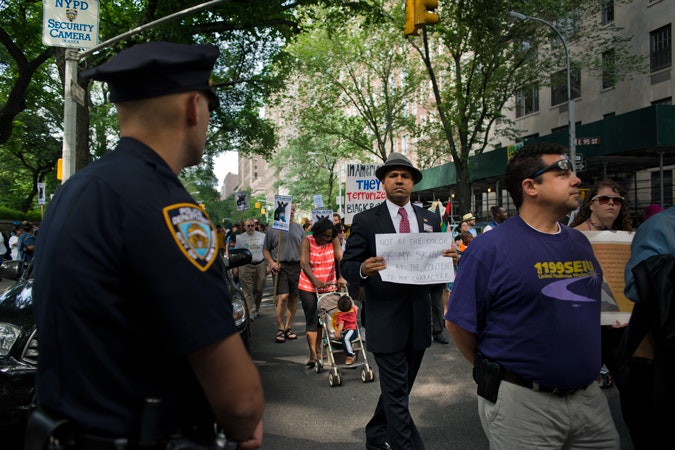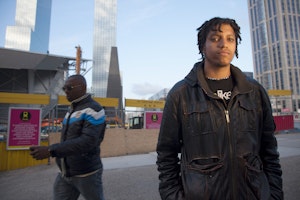Police Profiling: A Global Problem
By Terrance Pitts & Marc Krupanski

The Open Society Foundations support efforts to document and remedy profiling by law enforcement in the United States and Europe. Strategic litigation is a key tool, and a new wave of cases is challenging profiling in New York, the UK, Australia, and France. Here, Marc Krupanski of the Open Society Justice Initiative and Terrance Pitts of our U.S. Programs discuss how the debate over police stops is playing out in different parts of the world.
Marc Krupanski: The historic racial profiling trial in New York City—Floyd v. City of New York—challenging police stop and search practices recently ended. What, if anything, surprised you in the trial?
Terrance Pitts: New York City police have been stopping hundreds of thousands of law abiding New Yorkers every year, and the vast majority are black and Latino. Despite serious concerns over racial profiling, illegal stops, and privacy rights, the NYPD has been defiant and reluctant to take a close look at their stop-and-frisk practices or consider how the overuse of the tactic may be damaging community relations.
During the trial testimony, there was a stark contrast between the perspectives of community members impacted by stop-and-frisk and the NYPD. Plaintiffs’ witnesses gave testimony detailing a sense of victimization and humiliation at the hands of the police. They discussed, quite movingly, being stopped because of the color of their skin, the clothes they wore, or what neighborhood they lived in. When people are stopped on their way to school, coming from football practice, or hanging out with friends, it makes them feel they aren’t part of society or less than everyone else. Their sense of public humiliation came out repeatedly in the testimony. The NYPD, on the other hand, does not see these incidents as stigmatizing but as a necessary law enforcement tactic. This says something about how communities of color are perceived as criminals by law enforcement in New York City. But their presumed criminality isn’t held up by the hit rate on the stops: only six percent of all stops result in arrest and the gun retrieval rate is only 0.15 percent.
But I was really surprised by the testimony from courageous officers who spoke out against policing practices that they believe are patently unfair and potentially unconstitutional. These officers have criticized NYPD policies and practices, formal and informal, which place performance goals or quotas on officers to make stops, summonses or arrests, and which they claim specifically target black and Latino communities, particularly young men.
MK: Right, that is something that has also come out in cases in the UK (Roberts v. The Commissioner of the Metropolitan Police and the Secretary of State), France (Kaouah and others), and Australia (Haile-Michael). We’ve heard about how this practice has impacted people on a personal level, but also how it impacts families and entire communities, ultimately undermining trust and legitimacy in the police within significant communities. Only in the UK have we seen the police promise to review the use of Section 60, a law that allows police officers in England and Wales to stop people without reasonable suspicion, promising to curtail those stops. Let’s hope they do.
TP: Do you see any similarities in the Floyd case to jurisdictions outside the U.S.?
MK: One of the problems we’ve seen in other locations, such as in France and Spain, is that the police do not document stops. Also, some countries are very resistant to collecting ethnic or racial disaggregated data under the false ideal that race does not function in society. Of course, in New York it’s quite different where the NYPD collects data on stops, including disaggregated racial data. So, although we see that stop forms alone don’t prevent racial profiling, as in New York, they are a critical management and oversight tool that allows for more scientific internal and external accountability.
But one of the problems in New York is that there is no space for narratives on the form - just the use of check boxes. The narrative aspect can be important to document the reason for the stop and to verify use of reasonable suspicion. In Australia, as part of the settlement, the police officers’ diaries were made public. Even though they didn’t use stop forms, the diary pages revealed their reasons for stops, which referred to plaintiffs as “criminals loitering” in an area—despite the fact no one was arrested or charged with anything—or that the individuals “appeared nervous in police presence” or were wearing “homeboy clothing.” This revealed the police weren’t relying upon reasonable suspicion, but maintained an association of young black people, especially men, as being criminal. If you are black and in a public space, the police overwhelming and unfairly suspect you of criminal activity. If you are in a group, you’re in a gang. If you are by yourself, you’re a drug dealer. As the lawyers argued, it perversely switches the burden on African Australians to justify being in a public space rather than placing the onus on the police, as required by law, to have a legitimate reason to interfere with freedom of movement. It flips the script for the rule of law and what it means to live in a contemporary democratic society.
TP: The practice of stop-and-frisk could be a legitimate law enforcement tactic, but the tactic is overused, and not carried out as mandated by case law or the constitution and impinges the ability of citizens in targeted communities to move freely. These issues are at the heart of Floyd. The notion that an entire group of citizens can be singled out for suspicion tears apart some of the core framework of the U.S. Constitution. The 4th Amendment prohibits unreasonable searches and seizures, and 14th Amendment guarantees equal protection under the law. But the Floyd case also makes us think about the kind of society we want to create and live in. It begs the question of how we choose to create a democratic society. This is important to consider as New York quickly becomes a majority “minority” and multicultural city with a large immigrant population.
MK: What were some of the remedies discussed in the Floyd case?
TP: One of the remedies asked for by the plaintiffs in Floyd is to modify the stop form—the UF 250—to include a narrative portion to allow officers to articulate justification for reasonable suspicion. Another requested remedy is to eliminate any policies that require officers to meet quotas, performance goals, or other measures that create an incentive to stop without reasonable suspicion. The plaintiffs are also asking for a court appointed monitor to oversee any injunctive relief and to have a facilitator to manage the injunctive relief process. The plaintiffs also want a comprehensive evaluation of all stop-and-frisk polices, practices and supervision. Another important component is to have the community help articulate an appropriate remedy.
Whatever the remedy, we know successful reforms of police practices anywhere, not just New York City, require accountable police leadership that values community input. To be long-lasting, the next New York City mayor and police commissioner are going to have to be behind some of the proposed reforms. Community leaders will have to continue to speak up and articulate concerns about policing practices to hold the city’s leaders accountable.
TP: How do we best address problem of racially biased policing?
MK: The use of stop of forms by police can help as a first step, but we need other mechanisms. Police should articulate a valid reason for stops, and stops should be based upon reasonable suspicion. Forms should be reviewed by police supervisors and designated civil society to provide oversight. Training police is an option, but training by itself does not solve the problem. We must work to improve police–community dialogue and create productive spaces where police can meet with communities to hear what people want from police. Policing is a public service and needs to be reoriented as such. The Open Society Justice Initiative tries to support efforts that enhance police-community dialogue. For instance, we had a project in the UK and the Netherlands in partnership with the Open Society Youth Initiative to bring together police and visible minorities to discuss public safety. We also find it important to build the leadership capacity of communities so they can say what kind of policing they want in their communities. This means highlighting the impact discriminatory policing practices have on peoples’ lives and their communities as well as their vision for policing in their communities.
Until January 2016, Terrance Pitts was a program officer for the Justice Fund at the Open Society Foundations.
Until September 2021, Marc Krupanski was a senior program officer for the Open Society Public Health Program.
